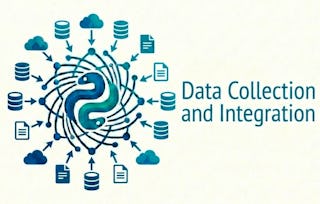This course will provide you with an overview over existing data products and a good understanding of the data collection landscape. With the help of various examples you will learn how to identify which data sources likely matches your research question, how to turn your research question into measurable pieces, and how to think about an analysis plan. Furthermore this course will provide you with a general framework that allows you to not only understand each step required for a successful data collection and analysis, but also help you to identify errors associated with different data sources. You will learn some metrics to quantify each potential error, and thus you will have tools at hand to describe the quality of a data source. Finally we will introduce different large scale data collection efforts done by private industry and government agencies, and review the learned concepts through these examples. This course is suitable for beginners as well as those that know about one particular data source, but not others, and are looking for a general framework to evaluate data products.

Framework for Data Collection and Analysis

Framework for Data Collection and Analysis
This course is part of Survey Data Collection and Analytics Specialization


Instructors: Frauke Kreuter, Ph.D.
35,919 already enrolled
Included with
773 reviews
Skills you'll gain
Details to know

Add to your LinkedIn profile
4 assignments
See how employees at top companies are mastering in-demand skills

Build your subject-matter expertise
- Learn new concepts from industry experts
- Gain a foundational understanding of a subject or tool
- Develop job-relevant skills with hands-on projects
- Earn a shareable career certificate

There are 4 modules in this course
The first course in the specialization provides an overview of the topics to come. This module walks you through the process of data collection and analysis. Starting with a research question and a review of existing data sources, we cover survey data collection techniques, highlight the importance of data curation, and discuss some basic features that can affect your data analysis when dealing with sample data. Issues of data access and resources for access are introduced in this module.
What's included
9 videos5 readings1 assignment2 discussion prompts
In this module we will emphasize the importance of having a well-specified research question and analysis plan. We will provide an overview over the various data collection strategies, a variety of available modes for data collection and some thinking on how to choose the right mode.
What's included
6 videos2 readings1 assignment
In this module you will be introduced to a general framework that allows you to not only understand each step required for a successful data collection and analysis, but also helps you to identify errors associated with different data sources. You will learn some metrics to quantify each potential error, and thus you will have tools at hand to describe the quality of a data source.
What's included
8 videos3 readings1 assignment
In this module we introduce a few surveys across a variety of topics. For each we highlight data collection features. The surveys span a variety of topics. We challenge you to think about alternative data sources that can be used to gather the same information or insights.
What's included
8 videos2 readings1 assignment2 discussion prompts
Earn a career certificate
Add this credential to your LinkedIn profile, resume, or CV. Share it on social media and in your performance review.
Instructors

Offered by
Explore more from Data Analysis
 Status: Free Trial
Status: Free TrialUniversity of Colorado Boulder
 Status: Free Trial
Status: Free TrialUniversity of Michigan
 Status: Free Trial
Status: Free Trial Status: Free Trial
Status: Free TrialGoogle
Why people choose Coursera for their career

Felipe M.

Jennifer J.

Larry W.

Chaitanya A.
Learner reviews
- 5 stars
54.98%
- 4 stars
25.22%
- 3 stars
11.90%
- 2 stars
4.01%
- 1 star
3.88%
Showing 3 of 773
Reviewed on Jul 12, 2020
It is a very fundamental and brief explanation about data collection, especially for the survey process.
Reviewed on May 18, 2019
Excelente curso, genera las herramientas necesarias para la recoleccion, transformacion, analisis e interpretacion de datos que requiero como principiante en este proceso
Reviewed on Oct 30, 2020
Useful to build basic knowledge which helps you choosing a better mode and linking the objectives of research with the tools (how).Thanks to the instructor and Coursera.

Open new doors with Coursera Plus
Unlimited access to 10,000+ world-class courses, hands-on projects, and job-ready certificate programs - all included in your subscription
Advance your career with an online degree
Earn a degree from world-class universities - 100% online
Join over 3,400 global companies that choose Coursera for Business
Upskill your employees to excel in the digital economy
Frequently asked questions
To access the course materials, assignments and to earn a Certificate, you will need to purchase the Certificate experience when you enroll in a course. You can try a Free Trial instead, or apply for Financial Aid. The course may offer 'Full Course, No Certificate' instead. This option lets you see all course materials, submit required assessments, and get a final grade. This also means that you will not be able to purchase a Certificate experience.
When you enroll in the course, you get access to all of the courses in the Specialization, and you earn a certificate when you complete the work. Your electronic Certificate will be added to your Accomplishments page - from there, you can print your Certificate or add it to your LinkedIn profile.
Yes. In select learning programs, you can apply for financial aid or a scholarship if you can’t afford the enrollment fee. If fin aid or scholarship is available for your learning program selection, you’ll find a link to apply on the description page.
More questions
Financial aid available,

